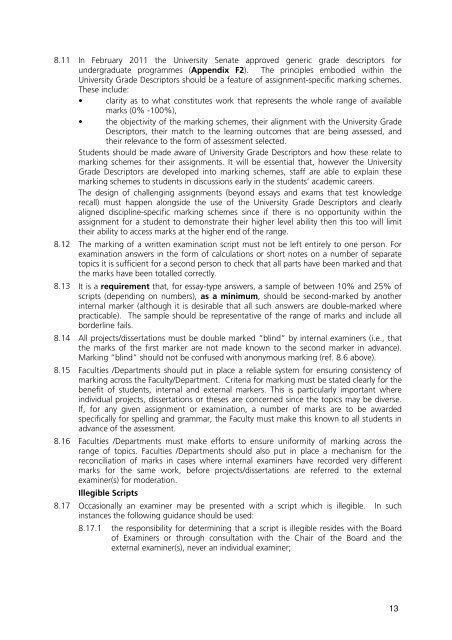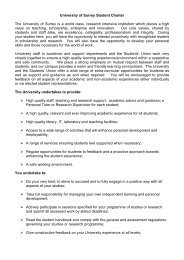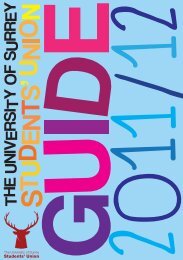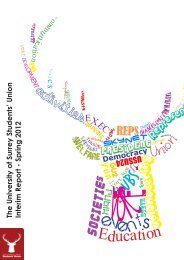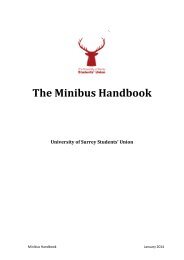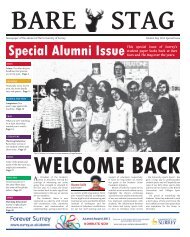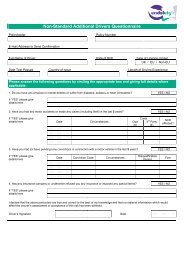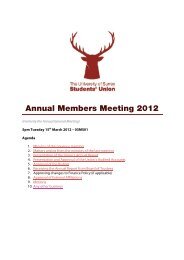asg section f - examinations and other forms of assessment
asg section f - examinations and other forms of assessment
asg section f - examinations and other forms of assessment
Create successful ePaper yourself
Turn your PDF publications into a flip-book with our unique Google optimized e-Paper software.
8.11 In February 2011 the University Senate approved generic grade descriptors for<br />
undergraduate programmes (Appendix F2). The principles embodied within the<br />
University Grade Descriptors should be a feature <strong>of</strong> assignment-specific marking schemes.<br />
These include:<br />
• clarity as to what constitutes work that represents the whole range <strong>of</strong> available<br />
marks (0% -100%),<br />
• the objectivity <strong>of</strong> the marking schemes, their alignment with the University Grade<br />
Descriptors, their match to the learning outcomes that are being assessed, <strong>and</strong><br />
their relevance to the form <strong>of</strong> <strong>assessment</strong> selected.<br />
Students should be made aware <strong>of</strong> University Grade Descriptors <strong>and</strong> how these relate to<br />
marking schemes for their assignments. It will be essential that, however the University<br />
Grade Descriptors are developed into marking schemes, staff are able to explain these<br />
marking schemes to students in discussions early in the students’ academic careers.<br />
The design <strong>of</strong> challenging assignments (beyond essays <strong>and</strong> exams that test knowledge<br />
recall) must happen alongside the use <strong>of</strong> the University Grade Descriptors <strong>and</strong> clearly<br />
aligned discipline-specific marking schemes since if there is no opportunity within the<br />
assignment for a student to demonstrate their higher level ability then this too will limit<br />
their ability to access marks at the higher end <strong>of</strong> the range.<br />
8.12 The marking <strong>of</strong> a written examination script must not be left entirely to one person. For<br />
examination answers in the form <strong>of</strong> calculations or short notes on a number <strong>of</strong> separate<br />
topics it is sufficient for a second person to check that all parts have been marked <strong>and</strong> that<br />
the marks have been totalled correctly.<br />
8.13 It is a requirement that, for essay-type answers, a sample <strong>of</strong> between 10% <strong>and</strong> 25% <strong>of</strong><br />
scripts (depending on numbers), as a minimum, should be second-marked by an<strong>other</strong><br />
internal marker (although it is desirable that all such answers are double-marked where<br />
practicable). The sample should be representative <strong>of</strong> the range <strong>of</strong> marks <strong>and</strong> include all<br />
borderline fails.<br />
8.14 All projects/dissertations must be double marked “blind” by internal examiners (i.e., that<br />
the marks <strong>of</strong> the first marker are not made known to the second marker in advance).<br />
Marking “blind” should not be confused with anonymous marking (ref. 8.6 above).<br />
8.15 Faculties /Departments should put in place a reliable system for ensuring consistency <strong>of</strong><br />
marking across the Faculty/Department. Criteria for marking must be stated clearly for the<br />
benefit <strong>of</strong> students, internal <strong>and</strong> external markers. This is particularly important where<br />
individual projects, dissertations or theses are concerned since the topics may be diverse.<br />
If, for any given assignment or examination, a number <strong>of</strong> marks are to be awarded<br />
specifically for spelling <strong>and</strong> grammar, the Faculty must make this known to all students in<br />
advance <strong>of</strong> the <strong>assessment</strong>.<br />
8.16 Faculties /Departments must make efforts to ensure uniformity <strong>of</strong> marking across the<br />
range <strong>of</strong> topics. Faculties /Departments should also put in place a mechanism for the<br />
reconciliation <strong>of</strong> marks in cases where internal examiners have recorded very different<br />
marks for the same work, before projects/dissertations are referred to the external<br />
examiner(s) for moderation.<br />
Illegible Scripts<br />
8.17 Occasionally an examiner may be presented with a script which is illegible. In such<br />
instances the following guidance should be used:<br />
8.17.1 the responsibility for determining that a script is illegible resides with the Board<br />
<strong>of</strong> Examiners or through consultation with the Chair <strong>of</strong> the Board <strong>and</strong> the<br />
external examiner(s), never an individual examiner;<br />
13


